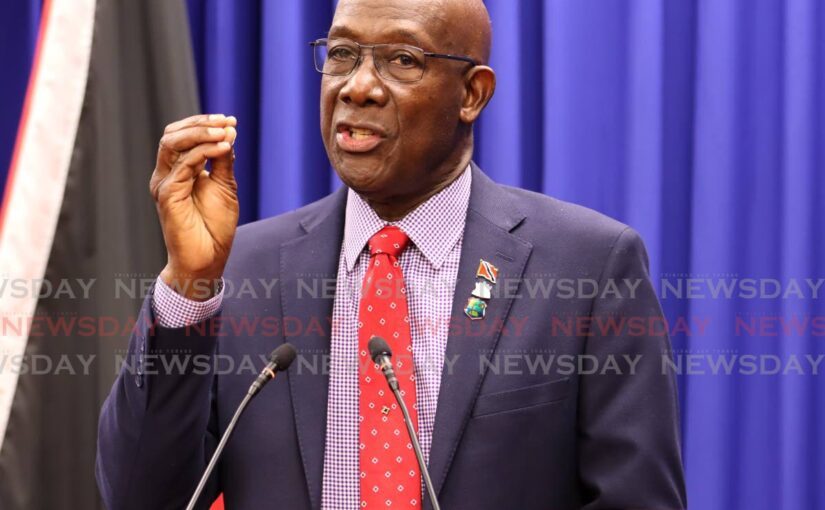“I am leaving this legacy behind to all of you; to bring unity, equality, love, and a realisation of how our lives should be. Without a vision,...
Vous n'êtes pas connecté
- English
- Français
- عربي
- Español
- Deutsch
- Português
- русский язык
- Català
- Italiano
- Nederlands, Vlaams
- Norsk
- فارسی
- বাংলা
- اردو
- Azərbaycan dili
- Bahasa Indonesia
- Հայերեն
- Ελληνικά
- Bosanski jezik
- українська мова
- Íslenska
- Türkmen, Түркмен
- Türkçe
- Shqip
- Eesti keel
- magyar
- Қазақ тілі
- Kalaallisut ; kalaallit oqaasii
- Lietuvių kalba
- Latviešu valoda
- македонски јазик
- Монгол
- Bahasa Melayu ; بهاس ملايو
- ဗမာစာ
- Slovenščina
- тоҷикӣ ; toğikī ; تاجیکی
- ไทย
- O'zbek ; Ўзбек ; أۇزبېك
- Tiếng Việt
- ភាសាខ្មែរ
- རྫོང་ཁ
- Soomaaliga ; af Soomaali
 Maroc - SPYETV.COM.NG - A La Une - 08/Jul 10:37
Maroc - SPYETV.COM.NG - A La Une - 08/Jul 10:37
The Nigeria Police Deserving Reforms, Improved Service Conditions And Campaign Of Calunmy
IntroductionThe ongoing debate surrounding the proposed amendment to the Nigeria Police Act, which aims to extend the retirement age of police officers from 60 to 65 years and service tenure from 35 to 40 years, has ignited considerable controversy and deliberation among stakeholders. This legislative proposal has significant implications for the future of policing in Nigeria, touching upon issues of governance, operational efficiency, and public trust. Understanding the importance of this debate requires a nuanced exploration of its potential impacts and the broader context within which it unfolds. This requires eliminating all sentiments associated with the current police leadership, and getting a bird’s eye view of the Bill. The Bill represents a crucial moment in the evolution of policing policies in Nigeria, addressing critical issues such as personnel management, institutional memory retention, and operational effectiveness. At its core, the proposed amendment seeks to modernize the structure of the Nigeria Police Force (NPF) to better align with contemporary challenges and global standards of policing. As stakeholders engage in rigorous discourse and analysis, it becomes evident that the outcomes of this legislative endeavour will not only shape the future trajectory of the NPF but also influence public perception and confidence in the police. Thus, the debate transcends mere legislative amendments, resonating deeply with issues of governance, public safety, and the overall socio-political landscape of Nigeria. Historical Context The proposal to amend the Nigeria Police Act originated in the 8th Assembly which held power between 2015 and 2019. This evidentially shows that the long-standing concerns about the structure and operation of the Nigeria Police Force has been on for a while. Initially, the bill aimed to address issues of experience retention and the mentoring of junior officers by senior personnel to ensure the maintenance of traditions and customs within the Force. Although it did not reach the final reading before the dissolution of that Assembly, the bill laid the groundwork for current discussions and showed a commitment to reform and modernization within the NPF. Overview of Existing Nigeria Police Act Provisions The Nigeria Police Act 2020 established several key guidelines, including a four-year tenure for the Inspector General of Police. Specifically, Section 7, subsection (6), dictates that the IGP serves a four-year term, with removal only possible through presidential action, based on advice from the Police Council, aiming to ensure stability in leadership and continuity in policing strategies. Under the current law, the retirement age for police officers is set at 60 years, with a maximum of 35 years of service. These parameters have been identified as areas for potential reform to enhance operational effectiveness and personnel management. The proposed amendment seeks to extend the retirement age from 60 to 65 years and the service tenure from 35 to 40 years aiming to leverage the vast experience of senior officers, retaining institutional memory and enhancing mentorship opportunities for younger personnel. Moreover, it addresses the need for strategic leadership in the face of contemporary policing challenges, where experience and historical knowledge play crucial roles in crime management. The Rationale Behind the Bill The proposed amendment to the Nigeria Police Act 2020, which seeks to extend the retirement age of police officers from 60 to 65 years and their tenure of service from 35 to 40 years, has sparked significant debate and controversy. Understanding the rationale behind this bill requires a careful examination of its intended benefits and implications for the Nigeria Police Force. One of the primary motivations behind the bill is to address the chronic shortage of skilled personnel within the NPF. Over the years, the government has faced significant challenges in recruiting and retaining qualified officers, leading to understaffing and increased workload on existing personnel. This has put the NPF far behind on meeting up with the United Nations approved 1 police officer to 460 citizens ratio. By extending the retirement age and tenure of service, the Bill aims to mitigate these shortages by allowing experienced officers to remain in active service longer to maintain operational continuity and effectiveness, especially in the face of evolving security threats across the country. The retention of experienced police officers is another critical objective of the proposed amendment. Experienced officers bring valuable skills, judgment, and institutional knowledge acquired over decades of service. Their continued presence in the Force ensures continuity in leadership, mentoring of junior officers, and effective management of complex policing challenges. Retaining such expertise is essential for enhancing the overall professionalism and efficiency of the NPF, ultimately contributing to improved public safety and security. Institutional memory is another vital rationale. This refers to the collective knowledge, experience, and historical perspective that senior officers possess within the NPF. This accumulated wisdom plays a pivotal role in guiding strategic decisions, shaping policies, and adapting to changing socio-political dynamics and criminal trends. By retaining senior officers beyond the traditional retirement age, the bill seeks to preserve this institutional memory within the Force. This continuity not only enhances organizational stability but also facilitates smoother transitions and succession planning at leadership levels, thereby bolstering the NPF's long-term effectiveness and resilience. IGP Egbetokun’s Perspective On the issues raised, the Inspector-General of Police, IGP Kayode Adeolu Egbetokun initially expressed reservations about extending the service years for police officers by an additional five years. However, following a comprehensive presentation by police pension experts, he was convinced that this extension would significantly enhance the pensionable earnings of police officers, a critical aspect of his commitment to improving the welfare of retired officers. Similarly, regarding the proposal for a four-year single tenure for the IGP, IGP Egbetokun believes that this duration is excessively long. He has variously advocated for a renewable two-year term, contingent upon the effective performance of the appointee, an approach that would promote accountability and allow for regular assessments of leadership effectiveness. It is also very important to note that by the time this bill undergoes the legislative process and receives presidential assent, the current IGP may no longer be in office. Therefore, he is not necessarily a direct beneficiary of the bill, contrary to the claims of some propagandists. Misconceptions and Opposition The recent debate surrounding the proposed amendments to the Nigeria Police Act, particularly the extension of retirement age and tenure of service for police officers, has been fraught with misconceptions and opposition. Key among these are mis-attributions regarding the role of IGP Kayode Adeolu Egbetokun and the perceived motivations behind the proposed changes. Contrary to recent publications suggesting otherwise particularly by Sahara Reporters in its usual sensational manner, IGP Egbetokun is not the originator of the amendments to the Nigeria Police Act 2020. The proposal to increase the retirement age of police officers from 60 to 65 years and extend their tenure of service from 35 to 40 years was first introduced as a private member bill by Hon. Gaza Gbefwi in the House of Representatives on October 3, 2023. The misconception that IGP Egbetokun is driving this initiative stems from a misunderstanding of the legislative process and the roles played by various stakeholders in lawmaking. As stipulated by the Police Act 2020, the tenure of the Inspector General of Police is fixed at four years, with provisions for removal by the President on the advice of the Police Council. Therefore, IGP Egbetokun, whose tenure is slated to end in October 2027, does not stand to benefit personally from the proposed amendments. Critics have raised concerns about potential conflicts of interest and self-serving agendas behind the proposed amendments. However, it is crucial to recognize that the objective of extending the retirement age and tenure of service is primarily aimed at improving the operational efficiency and institutional memory of the Nigeria Police Force (NPF). By retaining experienced senior officers for a longer period, the NPF can benefit from their wealth of knowledge and expertise in crime management, strategic planning, and operational leadership. Moreover, similar extensions in retirement age have been implemented in other sectors, such as the judiciary and the education sector, reflecting a broader trend towards maximizing the contributions of experienced professionals. A prime instance is the recent legislation extending the retirement age of teachers to 65 years in Nigeria. Opponents of the proposed amendments also argue that extending the retirement age and tenure of service could set a precedent for other agencies, potentially leading to a bloated bureaucracy and stagnation in career progression. However, it is essential to differentiate between strategic retention of expertise and administrative inefficiencies. Furthermore, the broader implications for public sector governance should be evaluated within the context of improving service delivery and organizational effectiveness. By maintaining a balance between continuity of leadership and opportunities for career advancement, the proposed amendments aim to create a sustainable framework for professional development within the NPF. Global Comparisons: Extending Retirement Age and Service Tenure for Police Personnel In the ongoing debate over the proposed amendment to extend the retirement age and service tenure of police officers in Nigeria, global comparisons offer valuable insights into similar reforms enacted in other countries. Countries like the United States, Canada, Australia, and Brazil have all adjusted the retirement age and service tenure for their law enforcement personnel, citing various benefits and considerations. Understanding these global examples can shed light on potential outcome and benefits for Nigeria. In the United States of America for example, the retirement age for police officers varies across states and jurisdictions. Many states have extended the mandatory retirement age beyond 60 years, recognizing the value of retaining experienced officers. For instance, California and Texas have the retirement age set for 67 and 65 years respectively. Some states allow officers to continue serving until they reach 70 years of age, provided they pass physical and cognitive fitness assessments. This approach aims to leverage the expertise and institutional knowledge of senior officers while maintaining public safety standards. In Canada, the retirement age for police officers also varies by province and territory. Several provinces have extended the retirement age to 65 years, aligning with changes in life expectancy and the evolving nature of policing challenges. The rationale includes reducing turnover costs, preserving experienced leadership, and enhancing the effectiveness of law enforcement operations. Like in the United States, these reforms aim to balance operational needs with the welfare and capabilities of aging officers. Australia has implemented reforms to extend the service tenure and retirement age for its Federal Police members. Recognizing the benefits of retaining skilled personnel, Australian jurisdictions have adjusted retirement policies to allow officers to serve until 65 years and 61 years of age for males and females respectively. This extension is part of broader efforts to manage workforce demographics, ensure continuity in leadership, and optimize resource allocation within law enforcement agencies. Benefits Observed in These Nations Retention of Institutional Knowledge: Extending retirement age allows police forces to retain experienced officers who possess invaluable institutional knowledge and expertise. This knowledge is crucial for training new recruits, improving operational strategies, and navigating complex law enforcement challenges. Cost Efficiency: By reducing turnover and recruitment costs associated with replacing retiring officers, extending retirement age can yield significant savings for police budgets. This includes savings on training, recruitment campaigns, and the logistical expenses of integrating new personnel into the force. Enhanced Public Safety: Experienced officers contribute to enhanced public safety outcomes through effective crime prevention strategies, community engagement, and crisis response. Their seasoned judgment and familiarity with local contexts can lead to more informed decision-making and better outcomes in critical incidents. Workforce Resilience: A diverse age range within the police force promotes workforce resilience, ensuring a mix of experience and vitality. This diversity allows police agencies to adapt to evolving threats, technological advancements, and community expectations effectively. Improved Morale and Professionalism: Extended service tenure can boost officer morale by providing career stability and opportunities for continued growth and development. This fosters a culture of professionalism and dedication within law enforcement agencies, enhancing overall job satisfaction and performance. Conclusion In conclusion, the proposed amendments to extend the retirement age and tenure of service for Nigeria Police officers highlight a pivotal moment for the country's law enforcement landscape. Constructive dialogue among stakeholders is essential to navigate the complexities and potential benefits of these reforms, which aim to mitigate personnel shortages, retain invaluable experience, and fortify institutional resilience within the Nigeria Police Force. As legislative deliberations continue, prioritizing transparency, comprehensive analysis, and evidence-based decision-making will be key to fostering a modern and effective policing framework that meets the evolving security needs of Nigerian communities. Encouraging a long-term vision for the NPF entails not only addressing immediate challenges but also laying the groundwork for sustained improvement in police welfare, operational capabilities, and public trust. By learning from global best practices and adapting them judiciously to local contexts, Nigeria can position its police force as a beacon of professionalism and integrity in the region. Ultimately, prioritizing police welfare alongside strategic reforms will not only enhance law enforcement effectiveness but also contribute to a safer and more secure society for all Nigerians. Muyiwa Adejobi, a Public Relations and Security Experts. He can be reached via princemoye@gmail.com www.twitter.com/spyetv
Articles similaires
Police Arrest 1,284 Suspects, Recover 284 Firearms, 97 Kidnap Victims Rescued in 6 Weeks, Parade 35 Suspects
...As IGP Implements Other Strategies to Tackle Crimes Operatives continue to strive as police record the arrest of 307-armed robbery suspects, 296...
Tema Mankralo hails IGP, POMAB for effective policing
The Tema Traditional Council has expressed its gratitude to the Ghana Police Service for the enhanced peace and security in the Tema traditional area....
EFF and MK Party slams police minister Senzo Mchunu's budget for crime prevention strategy
The Economic Freedom Fighters (EFF) and uMkhonto weSizwe Party (MK) have slammed police minister Senzo Mchunu’s budget vote, arguing that it lacks...
Nigeria Shows Remarkable Improvement in Anti-Corruption Efforts, UNODC Report Says
... As NPF Emerges Most Improved Organization Against Corruption... Nigeria's Anti-Corruption Drive Yields Positive Results, According to UNODC's...
Your effective policing is visible - Vice President Bawumia commends IGP Dampare
The Vice President and Chairman of the Police Council, Dr Mahamudu Bawumia, has said the positive impact of the initiatives being undertaken in the...
Prime Minister urges Tobagonians: Work with police
THE Prime Minister has called on Tobagonians to work with police officers who will be deployed from Trinidad to help fight crime. At a media briefing...
NPF TO COMMENCE ENFORCEMENT OF E-CMR, TASKS VEHICLE USERS TO REGISTER FOR SAFETY, SECURITY COMPLIANCE
As part of the efforts of the Inspector-General of Police, IGP Kayode Egbetokun, NPM, Ph.D, to enhancing the security of lives and property, the...
Deepen collaboration with other security agencies, IGP urges police personnel
The Inspector General of Police (IGP), Dr George Akuffo Dampare, has urged police officers to work closely with other security agencies to provide a...
Tobago DCP: Customer service must be part of police culture
DEPUTY Commissioner of Police, Operations, Junior Benjamin says customer service must become part of the culture of the police service if it is to...
Les derniers communiqués
-
Aucun élément










